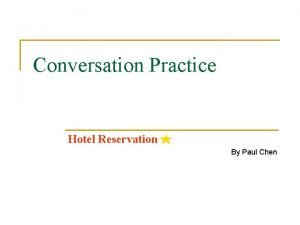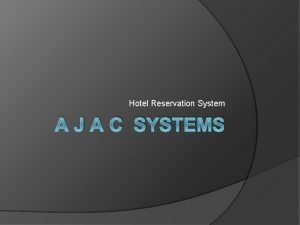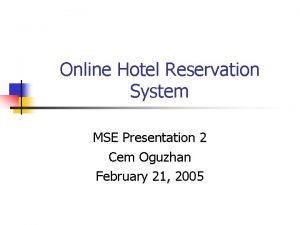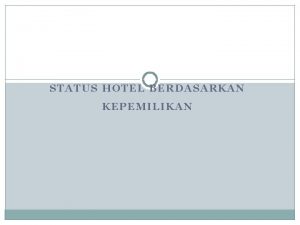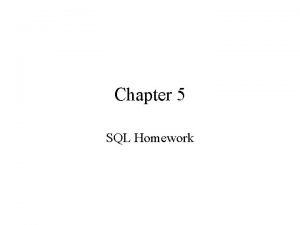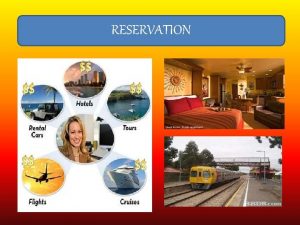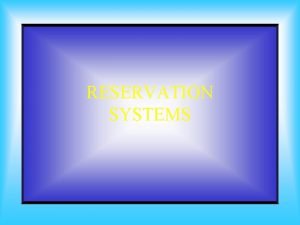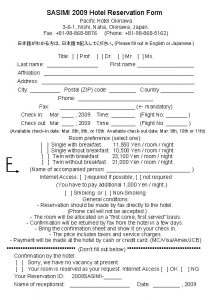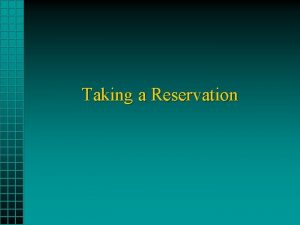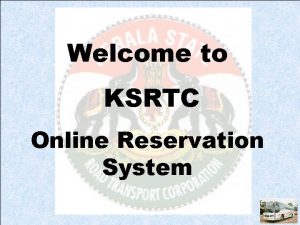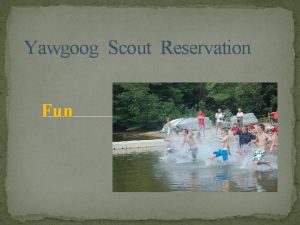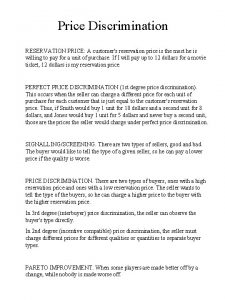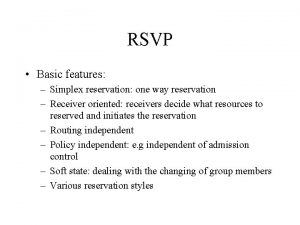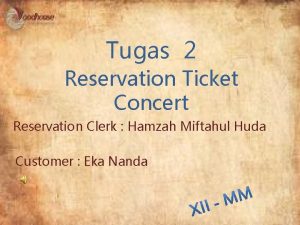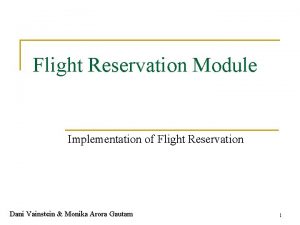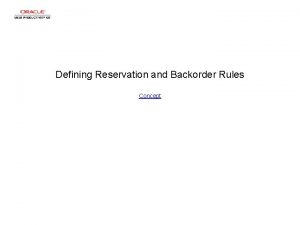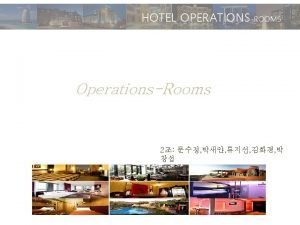English For Hotel Taking Reservation Heti Rokhismawarti Nurdiana























- Slides: 23

English For Hotel Taking Reservation Heti Rokhismawarti Nurdiana Kusuma A (13420) (13420257)

Taking reservations accurately is one of the most critical parts of operating a hotel. Making sure a front office has clear and consistent reservation procedures is one of the surest ways to increase a hotel's efficiency. Reservations are the most reliable revenue stream for many hotels, and they affect everything from cash flow projections to staffing. Ensuring that guests get the accommodations when they expect them is the easiest way for a hotel to reduce complaints and increase guest satisfaction.

Traveler reviews and find deals on hotels! Finding a Room When a guest calls to request a room for a specific place and time, this is called checking availability. Most hotels have a management system that tells reservation clerks the kinds and types of rooms available for given periods and lists prices for those rooms. Reservation clerks, once they have found a room for the guest, should provide a brief description of the facilities. The description should recount the bed size and number of beds in the room along with any special accommodations included, such as a refrigerator or balcony.

Requests and Guarantees A critical part of any hotel reservation procedure is to note special requests so they are properly accommodated. If a particular room type is not available, for example, guests will make a reservation for a different room type and ask that their original preference be noted. Alternately, a guest might require a crib or a roll-away bed for a child. Once the accommodations are settled, guests are often asked to guarantee a room with a credit card. Some hotel procedures allow a temporary hold with no credit card in expectation of a deposit.

Policies and Procedures Since reservations are meant to prevent a hotel from being oversold, making sure a potential guest understands the reservation cancellation policies can prevent rooms from being held unnecessarily. Likewise, a guest should know what time he can check into a room and what time he must check out. Reservation procedures should direct front office clerks to make these clear to the guest before completing the reservation. A good reservation procedure includes instructions about parking and any associated fees as well as the availability of airport and public ground transportation.

Strong Confirmation Procedure Recapping the reservation is possibly the most critical part of the process. It allows the reservation clerk to spell out clearly what she has marked down for the guest and for the guest to hear the terms of the room. The hotel employee should repeat the room type, with any special requests, the day and date of arrival and departure, the cost of the room and the guarantee and cancellation policies. Once all the information is repeated and the guest agrees, the reservation clerk provides a reservation confirmation number the guest can use when checking in or on future calls.

Types of Hotels & Rooms Housekeeping is the primary task the hotels need to cater for while providing service to its guests. The hotel management and especially executive of housekeeping department must ensure that the housekeeping functions are performed well in the hotel irrespective of the target guest type, size of hotel, and its location. The guest rooms are the primary source of hotel revenue. There are higher chances of retaining the guests if the guest rooms are absolutely clean.

Types of Hotels The hotels can be categorized depending upon their size, location, target market, and ownership.

Hotel Types by Size Hotels are categorized by the number of rooms to which service is provided. For example − Below 200 rooms – Very Small Up to 200 rooms – Small 200 to 399 rooms – Medium 400 to 700 rooms – Large More than 700 rooms – Mega This category is useful if the management needs to compare different hotels within the same size.

Hotel Types by Location They are categorized by considering their location with respect to city. Airport Hotels − They are located near airport. The guests in transit use them for short stay. Boatels − They are on the houseboats such as Shikara in Kashmir. City Center − Located in the heart of the city near commercial area. Motel − They are small hotels usually located on highways. Transit guests use them. Suburb Hotels − They are located near urban area. Budget guests use them. Floating Hotels − They are on the cruise ships, large lakes, or rivers. Resorts − They are on the beaches, mountains, islands, or on the river banks. Rotels − They are hotels on wheels such as Deccan Odyssey train. Self-Catering Hotels − They are located at the same premises where the owner stays.

Hotel Types by Target Market Here, the hotels are categorized depending upon the target market they serve. Airport Hotels − They target the business clientele, airline passengers, or any guests with cancelled or delayed flights. Business Hotels − They primarily cater for the guests who are on business travel. Bed and Breakfast (B&B) − They are small hotels who target guests in transit or on leisure tour. The owner of B&B usually stays in the same premises and is responsible for serving breakfast to the guests. Casino Hotels − They target the guests interested in gambling. Their functions of housekeeping is primary but food and beverage functions are just supportive. Resorts − They target high-income busy professionals who wish to spend time away from city, noise, and crowd. They offer facilities such as spa, tennis court, fitness and center, sailing, snorkeling, and swimming. Self-Catering Hotels − They target long stayers who prefer to cook themselves. They offer a small kitchen and kitchen amenities with the guest room. Service Apartments − They are located in residential colonies. They provide longterm accommodation for guests. They need to execute an agreement with the guests for the stay of at least one month. All basic amenities such as kitchen, washing machine, dish washer, and beds are provided with once a week housekeeping service. Suite Hotels − These hotels offer a living room and an en suite bedroom. The professionals who need to interact with their clients/customers find these hotels a good choice because they can interact with their guests in small meetings without

Hotel Types by Ownership B&B and Self Catering hotels are generally family owned hotels and are not governed or run by corporate policies and procedures. A chain of hotels or group of hotels such as Taj, Ramada, can have management affiliation with their other properties in the same group. They strictly are governed by predetermined policies.

Hotel Types by Star Rating The star rating system is a guideline for a customer that denotes what to expect from the hotel service at the time of booking. However, there is no clear distinguishing method to divide hotels into various star rating categories till today; but a guest can assume that more the number of stars, more is the luxury provided by the hotel. One Star − A guest can expect a small hotel operated and managed by the owner and family. The ambience as more personal and the guest rooms with basic amenities. The restaurant would be at a walking distance. There would be a small commercial area and a nearby public transportation hub. Two-Star − These hotels are mostly part of a chain of hotels that offer consistent quality but limited amenities. They are either small or medium size hotels with a phone and TV. They lack the convenience of room service, but provide a small on-site restaurant at a walking distance within the hotel premises. Three-Star − These hotels are usually located near a major business center, express way, and/or shopping area. The rooms are clean and spacious rooms, and decorative lobbies. An on-site restaurant offers all meals such as breakfast, lunch, and dinner. The facilities such as valet and room service, fitness center, and a swimming pool are also available. Four-Star − This hotel would be large, often standing as a part of a cluster of similar hotels with a formal appearance and very good services. The hotel would be located in the prime area of the city around shopping, dining, and entertainment joints. The guest can expect furnished and clean rooms, restaurants, room service, valet parking, and a fitness center within the hotel premises. Five-Star − This hotel would be large and luxurious, which offers the highest degree of room and personal service. It is built with beautiful architecture, and is managed keeping elegance and style in mind. The guest rooms are equipped with high quality linens, TV, bathtubs, and special outside view from the room. The hotel provides multiple eating joints in its premises such as coffee shops, restaurants, poolside snack joint, and bar. They also provide 24 X 7 room service, valet service, and personal protection service

Types of Hotel Rooms The condition of guest rooms maintained by housekeeping is the most vital factor as far as the customer satisfaction in the hotel business is concerned. Single Room − A room with the facility of single bed. It is meant for single occupancy. It has an attached bathroom, a small dressing table, a small bedside table, and a small writing table. Sometimes it has a single chair too. Double Room − A room with the facility of double bed. There are two variants in this type depending upon the size of the bed ◦ King Double Room (with king size double bed) ◦ Queen Double Room (with queen size double bed) It is equipped with adequate furniture such as dressing

Room Rate Determining a standard room rate is one ofthye challengging and though jobs for hotel as design ated room rate must be capable of generating revenue and compensate other costs of the hotel, such as administrative costs, overhead, and utility costs. Room rate could be typically defined as the price or cost that is charged by the hotel or lodging industry for overnight lodging. A hotel generally assigns a standard rate for each room category which is termed as the rack rate (a retail rate of guest room). Despite of its charge rack rate doesn’t always ensure profit for the hotel. Rack rate for room could be varied due to the other room rate schedules along with room types, pattern, and designation.

Types of Hotel Room Rates 1. Commercial rates: Commercial room rates are given to the business representative of a particular company. These business people are not the frequent guests and occasionally stay in the hotel. 2. Government rate : A discount or special rate which is negotiated with government organization for their foreign visitors and traveling official staffs. 3. Corporates : Corporates are offered to existing business guest of the hotel. 4. Frequent traveler rate : hotel developed frequent traveler program to offer frequent traveler rate to those who frequently visit the hotel due to repetitive business.

5. Military and educational rate : as the name suggests military and educational room rates are specially developed for military personnel and educators. 6. Family rates : special room rates are offered at particular season with a view to attract family with their children. 7. Membership rates: hotel offered membership rate in order to attract the potential members of large organization. 8. Group rates : group rates are developed for a large number of groups. 9. Industry rates: a negotiated special rate for the officials or staffs of the travel industrys

Currency Hospitality industry deals with guests all over the world. That’s why foreign currency transaction in hotel or restaurant is one of the most frequent tasks. The tourism bussiness of any country is the most important source integrating foreign currency in the country. A hotel has to follow the following steps in order to exchange the foreign currency which is extended by hotels as well. A Hotel has to obtain a license to exchange foreign currency. B. Hotel has to be authorized personnel to deal foreign exchange transaction. A.

C. Foreign exchange is done only in local currency. D. The rates of exchanged exhibited significantly at the exchanged point. E. Hotel will extend foreign currency exchange only for resident guests of the hotel.

Procedure for Accepting Foreign Currency in Hotel 1. 2. 3. 4. 5. Procedure which as followed are: Front offier chasier asks the guest for pasport and will very some identification from the pasport. From office chasier asks the guests for room number to confirm his/her status of being resident. In case of nonresident guest for room number to confirm his/her status being resident. In case of nonresident guest the front office chasier direct the guest to go to lobby manager for getting authorization who will only extend this facility to VIP or regular guests for the hotel. If foreign exchange as accepted by the Coverment then transaction are done in Dollars, Sterling Pounds, Euro, Yen.

6. Front office chasier receive the cash or Travelers Check. 7. Compute the total amount of local currency to be paid. 8. Fill the details in the foreign Exchange Encashment Certificate. 9. front office chasier request the guest to sign the Travelers check in case of exchange this cake. 10. Request the guest to sign the foreign exchange enchasment certificate to the travelers check. 11. provide the total amount of local currency

11. affix the second copy of the foreign currency echasment certificate to the travelers check. 12. Leave third copy of the certificate in the certicate book. 13. fill the details in the record of foreign currency transcated , which is control sheet of all foreign currency transaction in a sheet. 14. Under the foreign exchange coloumn, fill the details in the office chasier’s report.

 Telephone conversation script in hotel reservation
Telephone conversation script in hotel reservation Heti rpr
Heti rpr Hotel reservation system documentation doc
Hotel reservation system documentation doc Hotel reservation dialogue by phone
Hotel reservation dialogue by phone Hotel reservation system architecture
Hotel reservation system architecture Mcd gestion reservation hotel
Mcd gestion reservation hotel Mse reservation
Mse reservation Classification of hotels based on ownership
Classification of hotels based on ownership Hotel.hotelno=room.hotelno(hotel room)
Hotel.hotelno=room.hotelno(hotel room) Hyper-themed hotel: fantasyland hotel, canada
Hyper-themed hotel: fantasyland hotel, canada Greetings expressions and responses
Greetings expressions and responses Fspos vägledning för kontinuitetshantering
Fspos vägledning för kontinuitetshantering Typiska drag för en novell
Typiska drag för en novell Nationell inriktning för artificiell intelligens
Nationell inriktning för artificiell intelligens Returpilarna
Returpilarna Shingelfrisyren
Shingelfrisyren En lathund för arbete med kontinuitetshantering
En lathund för arbete med kontinuitetshantering Underlag för särskild löneskatt på pensionskostnader
Underlag för särskild löneskatt på pensionskostnader Tidböcker
Tidböcker Anatomi organ reproduksi
Anatomi organ reproduksi Vad är densitet
Vad är densitet Datorkunskap för nybörjare
Datorkunskap för nybörjare Boverket ka
Boverket ka Debatt artikel mall
Debatt artikel mall
